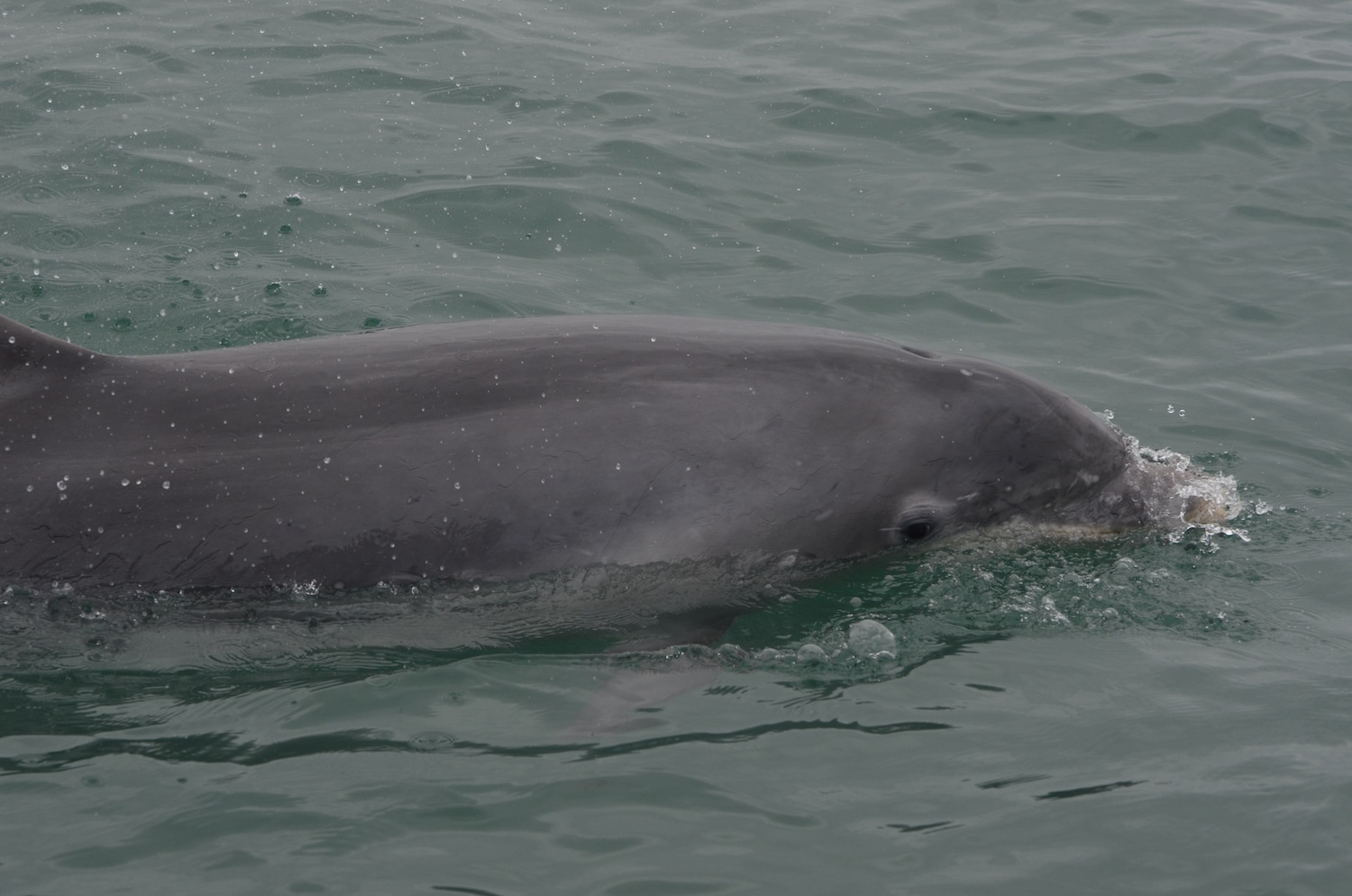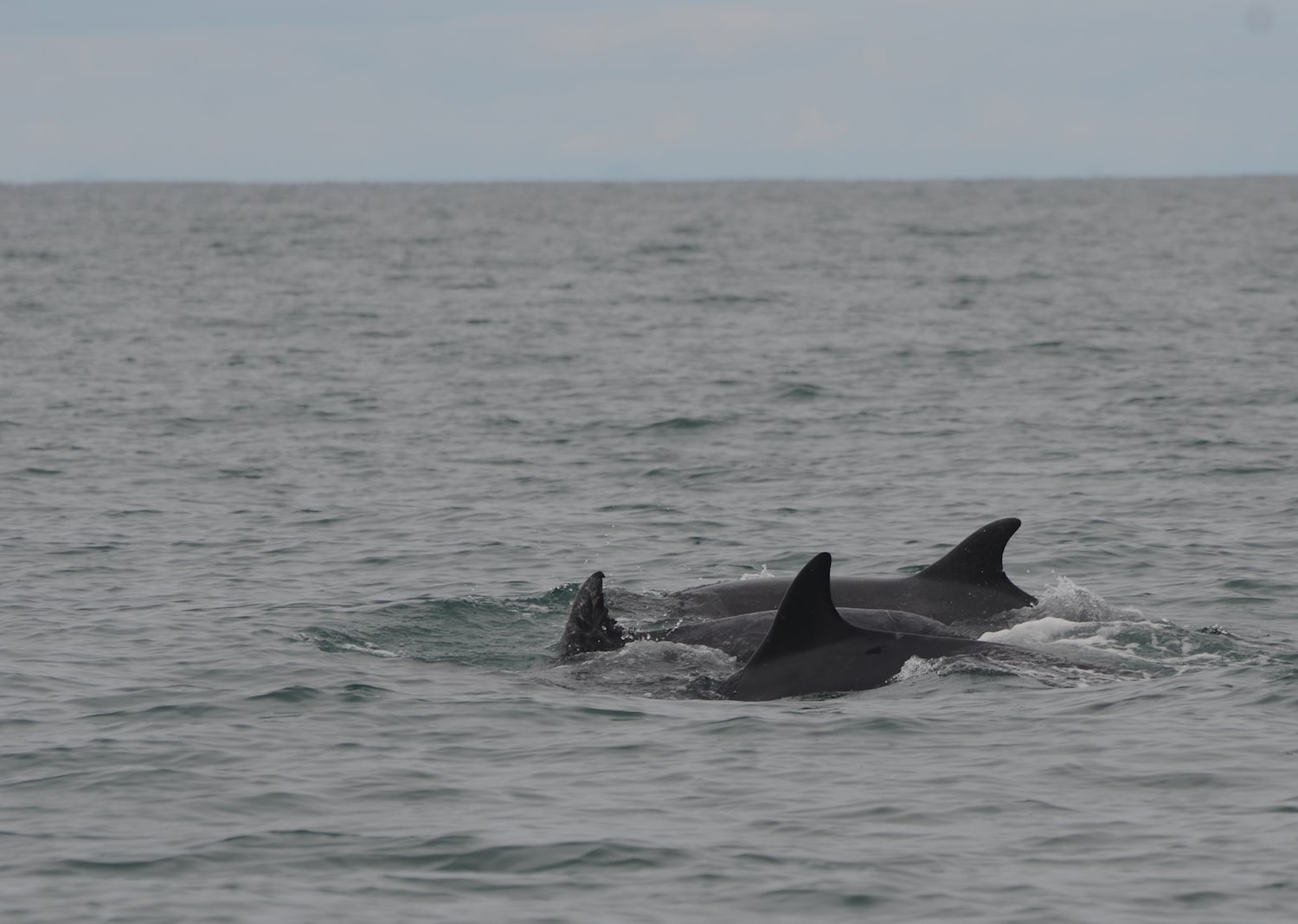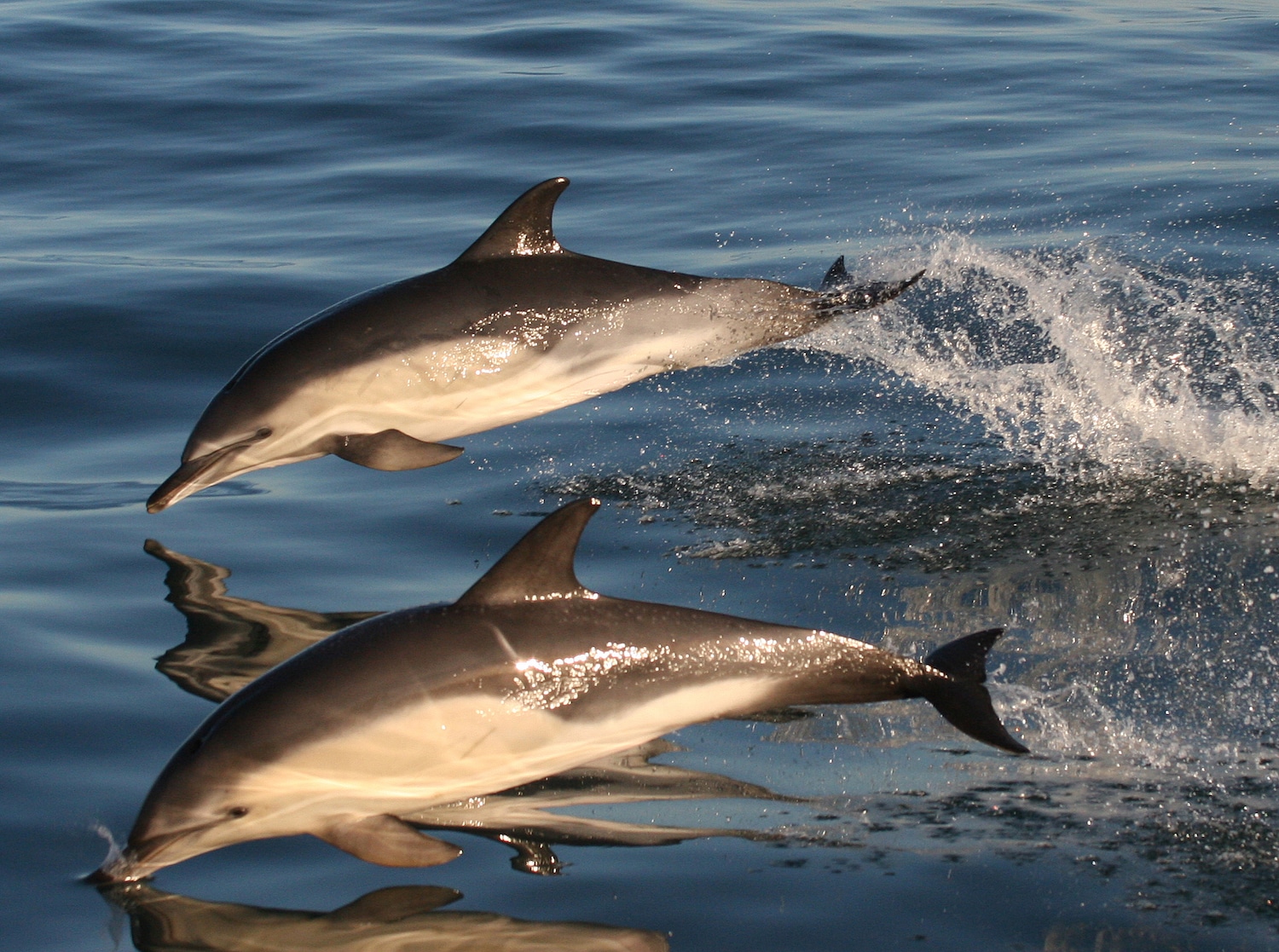Marine Life & Conservation
National Whale and Dolphin Watch 2018 is most successful yet! (Watch Video)

As the National Whale & Dolphin Watch concludes for another year, organisers are calling the 2018 event the most successful yet with an unprecedented variety of whale and dolphin species recorded around the UK during last week. Thirteen species and more than 500 sightings have been reported, and sightings continue to stream in.
“This looks like being the best National Whale & Dolphin Watch event of the last two decades,” reported Dr Chiara Giulia Bertulli, organiser of this year’s national event for the UK national research charity, Sea Watch Foundation.
The 2018 National Whale and Dolphin Watch event involving thousands of volunteers from all around the British Isles, conducted between 28th July and 5th August, has revealed the striking biodiversity of Britain’s Whales, Dolphins and Porpoises.

Photo: Chiara G. Bertulli / Sea Watch Foundation
This summer has seen a good number of humpback whale sightings all around the UK, with individuals popping up this last week in the North Sea off the Aberdeenshire coast and off Flamborough Head in Yorkshire. This species is making a noticeable come-back after many decades of exploitation in the North Atlantic.
“However, the most extraordinary sighting from this year’s Watch week”, adds Chiara, “was surely the Sowerby’s beaked whale which live stranded in the shallow waters of Belhaven in East Lothian, Scotland, on July 29th. This year also saw the addition of the striped dolphin, which in Britain and Ireland, is very rare, seen occasionally off the Atlantic coasts mainly in the south-west of Ireland. This species of warm temperate seas came to the shore at Pendine in South Wales on July 31st.”
Watch this video of short-beaked common dolphins filmed three miles off Dodman Point in South Cornwall.
Video: Rupert Kirkwood / thelonerkayaker:
At the time of writing, a total of 527 sightings have been submitted after the 9-day event. With regards to number of species recorded, results show that records at this stage are up 50% on last year. Cetacean data collection is strongly weather dependant. Factors such as sea state, swell height and visibility to the horizon affect how easily animals can be detected during a watch. Heavy rain and wind can even cause watches to be cancelled altogether.
For these reasons, every year, the volunteers rely heavily on good weather conditions for the success of National Whale and Dolphin Watch. Like previous years, this year’s event was scheduled over nine days to increase the chances of coinciding with a favourable weather window. The weather forecast at the beginning of the event was very poor with frequent showers and strong winds around the country which forced several watches to be cancelled and to be rescheduled to this past weekend. However, once the weather stabilized and the temperature increased the number of sightings increased dramatically and it showed.

Photo: SBCD – Peter G.H.Evans / Sea Watch Foundation
Possible explanations for this summer’s high number of cetacean species sighted during this year’s event are the good stable weather recorded this summer, with high temperatures which brought in warmer water species like striped dolphin, and created the conditions for plankton fronts to develop, attracting shoals of fish and in turn, whales and dolphins.
“We are seeing a general longer term trend,” adds Chiara, “for warm water species to be extending their range further north – species like the short-beaked common dolphin and the Risso’s dolphin as well as the striped dolphin. Since a greater number of species live in warm waters, the effects of climate change can actually be positive at mid latitudes such as around the British Isles.”
“We should still be a little cautious,” says Dr Peter Evans, Director of the Sea Watch Foundation. “Although new species of cetaceans have been added recently to the British list of mammals, there are more northern species that we could lose from our fauna – species like Atlantic white-sided dolphin and white-beaked dolphin, and the problem with tropical and warm temperate species entering our seas is that they face a much wider range of human pressures along the industrialised coastlines of northern Europe.”
All the verified sightings so far can be viewed online – www.seawatchfoundation.org.uk/nwdw-2018 – where they are updated as more reports come in.

Blogs
The Ocean Cleanup Breaks 10,000,000 KG Barrier

The Ocean Cleanup, the global non-profit project, has removed a verified all-time total of ten million kilograms (22 million lbs.) of trash from oceans and rivers around the world – approximately the same weight as the Eiffel Tower.
To complete its mission of ridding the oceans of plastic, The Ocean Cleanup uses a dual strategy: cleaning up the Great Pacific Garbage Patch (GPGP) to remove the plastic already afloat in the oceans, while stopping the flow of plastic from the world’s most polluting rivers.
Through cleaning operations in the GPGP and in rivers in eight countries, the cumulative total of trash removed has now surpassed ten million kilograms. This milestone demonstrates the acceleration of The Ocean Cleanup’s impact, while underlining the astonishing scale of the plastic pollution problem and the need for continued support and action.
While encouraging for the mission, this milestone is only a staging point: millions more tons of plastic still pollute our oceans and The Ocean Cleanup intends to continue learning, improving and innovating to solve this global catastrophe.
This announcement comes as governments from around the world meet to continue negotiations to develop a new legally binding instrument to end plastic pollution at INC4 in Ottawa, Canada. Representatives of The Ocean Cleanup will be in attendance and the organization will be urging decision-makers to collaborate towards a comprehensive and ambitious global treaty which addresses plastic at all stages of its life cycle and in all marine environments worldwide, including in areas beyond national jurisdiction.
It is encouraging to see that the need for remediation is reflected in the various options for potential treaty provisions. It is essential that the final treaty contains clear targets for the remediation of legacy plastic pollution, and reduction of riverine plastic emissions.
Tackling plastic pollution requires innovative and impactful solutions. The treaty should therefore incentivize the innovation ecosystem by fostering innovations that make maximal use of data, technology and scientific knowledge – such as those designed and deployed by The Ocean Cleanup.
‘After many tough years of trial and error, it’s amazing to see our work is starting to pay off – and I am proud of the team who has brought us to this point.’ said Boyan Slat, Founder and CEO of The Ocean Cleanup. ‘While we still have a long way to go, our recent successes fill us with renewed confidence that the oceans can be cleaned.’
The Ocean Cleanup was founded in 2013 and captured its first plastic in 2019, with the first confirmed catch in the GPGP coming soon after the deployment of Interceptor 001 in Jakarta, Indonesia. After surpassing one million kilograms of trash removed in early 2022, the non-profit project has since progressed to the third iteration of its GPGP cleaning solution, known as System 03, and a network of Interceptors currently covering rivers in eight countries, with more deployments set for 2024.
About The Ocean Cleanup
The Ocean Cleanup is an international non-profit organization that develops and scales technologies to rid the world’s oceans of plastic. They aim to achieve this goal through a dual strategy: stemming the inflow via rivers and cleaning up the legacy plastic that has already accumulated in the ocean. For the latter, The Ocean Cleanup develops large-scale systems to efficiently concentrate the plastic for periodic removal. This plastic is tracked and traced through DNV’s chain of custody model to certify claims of origin when recycling it into new products. To curb the tide via rivers, The Ocean Cleanup has developed Interceptor™ solutions to halt and extract riverine plastic before it reaches the ocean. Founded in 2013 by Boyan Slat, The Ocean Cleanup now employs a broadly multi-disciplined team of approximately 140. The foundation is headquartered in Rotterdam, the Netherlands.
For more information, visit: theoceancleanup.com and follow @theoceancleanup on social media.
Marine Life & Conservation
Steve Backshall to headline Shark Trust’s flagship event: For the Love of Sharks

Join a host of amazing, shark loving, speakers including Steve Backshall and the Shark Trust team for an evening celebrating shark conservation at the Royal Geographical Society in London this November.
Date: 29th November 2024
Time: 6-10pm
Location: Royal Geographical Society, London
Tickets: https://www.sharktrust.org/Event/flos24
The event will be a celebration of all things shark. Those lucky enough to get hold of tickets will hear from engaging guest speakers with a passion for sharks.
The line-up includes (*subject to change if unforeseen circumstances arise)
Steve Backshall: One of television’s busiest presenters, BAFTA award-winning wildlife expert Steve has been passionate about the wild world ever since he was young.
Steve’s impressive TV career has taken him all around the world, investigating a wide array of species and environments. Steve has filmed over 100 hours of children’s wildlife programmes with the BAFTA award winning Deadly 60 franchise and recently, with Sky Nature, for his new series ‘Whale with Steve Backshall’. He has been a patron for the Shark Trust for 10 years.
Simon Rogerson: is a photojournalist specialising in natural history, diving and the sea.
He is editor of SCUBA magazine, the official journal of the British Sub-Aqua Club. Simon started his career as a crime reporter but gravitated towards his ‘less depressing’ interest in underwater exploration, joining the staff of DIVE magazine in 1999. In 2005 he was named ‘Editor of the Year’ in the PPA’s Independent Publishing Awards. Simon also works as a freelance writer, contributing frequently to the Sunday Times and Telegraph, in addition to BBC Wildlife, Esquire, and a host of international diving magazines. He is the author of a book, Dive Red Sea, published by Ultimate Sports. Now based in Berkshire, Simon has been a Patron of the Shark Trust for 20 years.
More speakers to be announced soon. Head to the Shark Trust website to learn more.
The evening will also allow guests the final chance to see the Oceanic 31, shark art exhibition. Some of the artwork will be auctioned/raffled at the event, while the rest will be auctioned online to raise money for the Shark Trust Oceanic Programme.
For the Love of Sharks is an evening with something for everyone who is interested and fascinated by sharks. Join the Shark Trust, their Patrons, Trustees and Staff, along with a host of supporters for this celebration of shark conservation.
For more information or to buy a ticket: https://www.sharktrust.org/Event/flos24
-

 News3 months ago
News3 months agoHone your underwater photography skills with Alphamarine Photography at Red Sea Diving Safari in March
-

 News3 months ago
News3 months agoCapturing Critters in Lembeh Underwater Photography Workshop 2024: Event Roundup
-

 Marine Life & Conservation Blogs3 months ago
Marine Life & Conservation Blogs3 months agoCreature Feature: Swell Sharks
-

 Blogs2 months ago
Blogs2 months agoMurex Resorts: Passport to Paradise!
-

 Blogs2 months ago
Blogs2 months agoDiver Discovering Whale Skeletons Beneath Ice Judged World’s Best Underwater Photograph
-

 Gear Reviews3 weeks ago
Gear Reviews3 weeks agoGEAR REVIEW – Revolutionising Diving Comfort: The Sharkskin T2 Chillproof Suit
-

 Gear Reviews3 months ago
Gear Reviews3 months agoGear Review: Oceanic+ Dive Housing for iPhone
-

 Marine Life & Conservation2 months ago
Marine Life & Conservation2 months agoSave the Manatee Club launches brand new webcams at Silver Springs State Park, Florida





